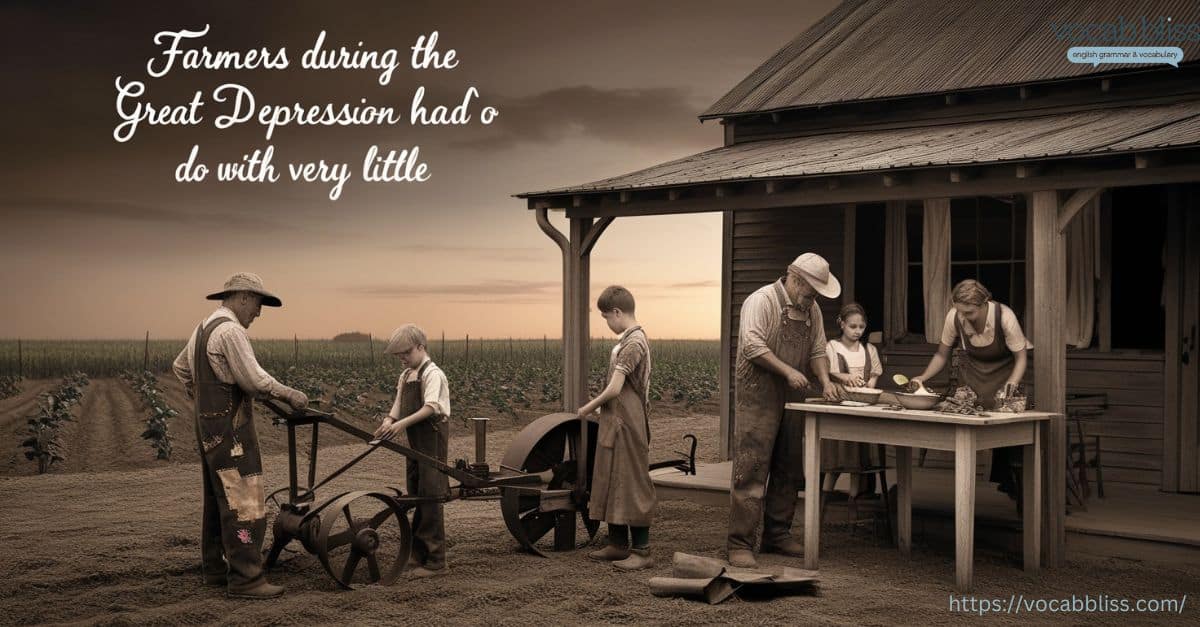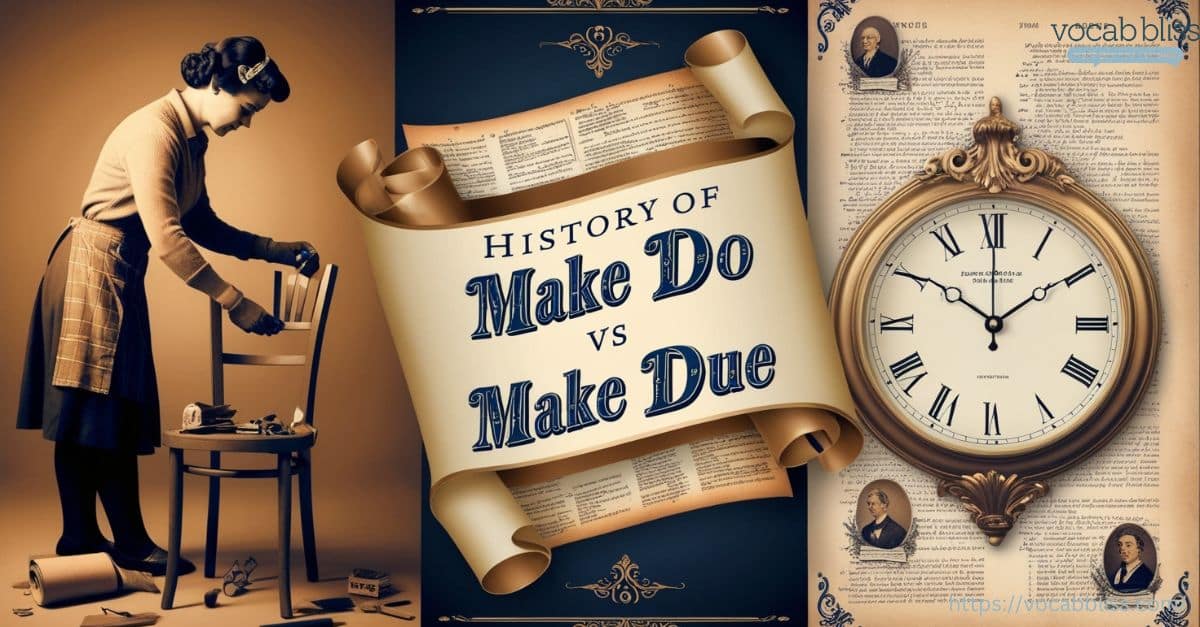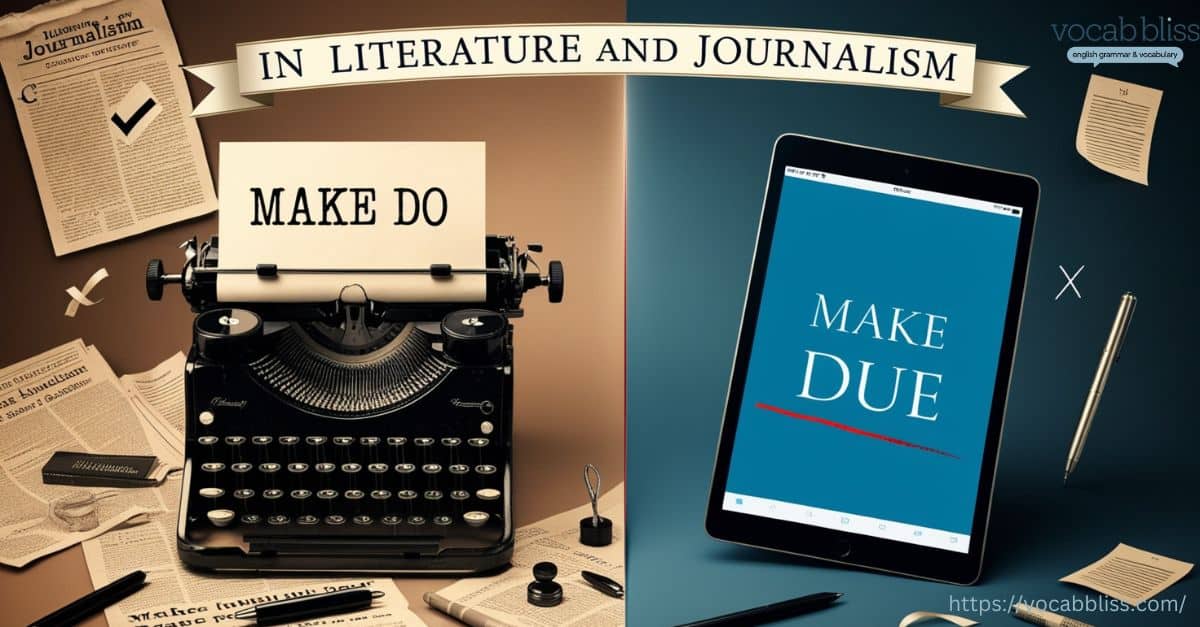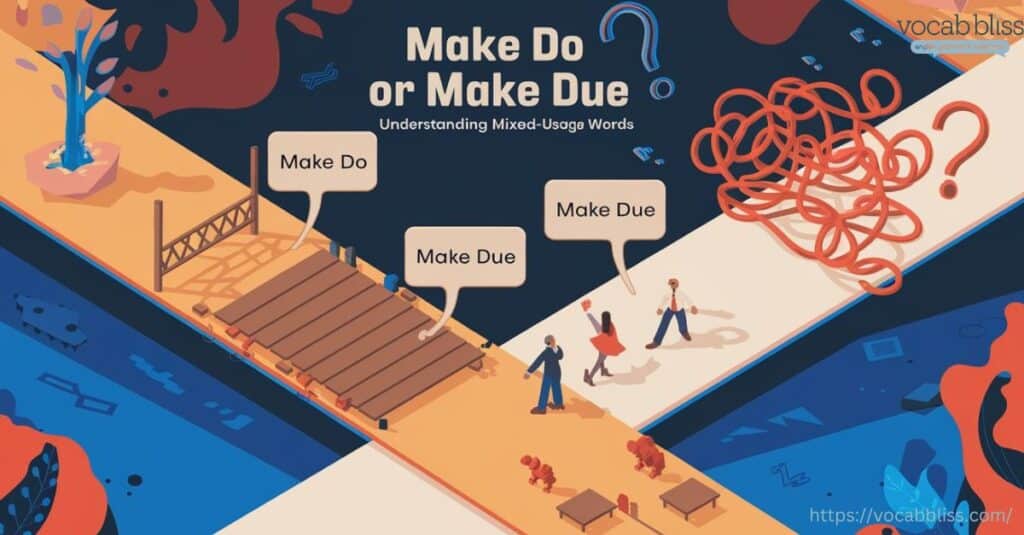Ever found yourself wondering whether to say make due or make do? You’re not alone! This common grammar mix-up trips up many English speakers. The phrases sound nearly identical, yet one is correct, and the other is a mistake.
Using the wrong phrase in conversation or writing can lead to confusion, especially in professional or academic settings. In this guide, we’ll break down the difference between make do and make due, explore real-world phrase usage, and offer alternatives to make do when needed.
By the end, you’ll never second-guess yourself again!
Understanding Make Due vs Make Do
Make Due Meaning?
Definition and Why It’s Usually Incorrect
The phrase “make due” is almost always a mistake. While the word “due” itself is correct in other contexts (such as referring to deadlines or something owed), it does not work in this phrase. People often confuse it with “make do” because of their similar pronunciation.
- “Due” means something that is owed, expected, or scheduled (The rent is due tomorrow).
- “Make due” would suggest someone is creating a deadline or obligation, which doesn’t make sense in the way people try to use it.
Common Contexts Where People Mistakenly Use “Make Due”
Many mistakenly write “make due” when they mean “make do”, especially in informal speech or writing. This confusion appears in to make do or due
- Casual conversations (We’ll just have to make due with what we’ve got. )
- Emails and text messages (Since the project is late, we’ll make due with what we have. )
- Social media posts (I forgot my charger, so I’ll make due without my phone. )
Examples of Incorrect Usage
- We didn’t have enough time, so we had to make due. (Incorrect)
- Since I left my wallet at home, I’ll make due without coffee today. (Incorrect)
- He forgot his tools but managed to make due with a pocketknife. (Incorrect)
In all these examples, the correct phrase should be “make do.”
Make Do Meaning?
Definition and Correct Usage
Unlike “make due,” the phrase “make do” is grammatically correct and widely accepted in English. It means:
- To manage with what is available
- To cope despite limitations
- To get by without the ideal resources
When you “make do,” you’re adapting to a situation rather than having everything you want or need.
Origins and History of the Phrase
The phrase “make do” dates back to at least the early 1900s, gaining popularity during wartime and economic hardships. During these periods, people had to improvise and stretch resources due to shortages.
A famous saying from World War II reflects this idea:
“Use it up, wear it out, make it do, or do without.”
This mindset of resourcefulness and adaptation is what “make do” represents.
Examples of Correct Usage
- We don’t have enough ingredients for a full meal, so we’ll make do with what we have.
- My laptop broke, but I can make do with my tablet for now.
- She didn’t have the perfect outfit, but she made do with what she had in her closet.
- Farmers during the Great Depression had to make do with very little.

Whenever you need to express coping, adapting, or managing despite limitations, “make do” is the correct phrase.
Find more: Brake vs Break: The Ultimate Word Battle
History of Make Do vs Make Due
The phrase “make do” has been part of the English language for centuries, tracing back to the 16th century. It originally meant to manage or cope with limited resources, often in the context of scarcity or necessity. Over time, it became widely used to indicate the act of making the best of what is available.
“Make due,” however, is a more recent and erroneous adaptation of the original phrase. The confusion likely stems from the similarity in sound between do and due. People began mistakenly replacing do with due, a word associated with something expected or owed, despite it not fitting the intended meaning.
The phrase “make due” has never had a proper historical precedent in standard English usage, and it remains an error in formal and informal contexts. Over time, “make do” solidified its place as the correct expression, while “make due” continues to be seen as a common, though incorrect, variant.

Side-by-Side Comparison
To clarify the difference between make do or make due, here’s a direct comparison:
Table: Make Do or Make Due
| Feature | Make Do (Correct) | Make Due (Incorrect) |
|---|---|---|
| Meaning | To manage with limited resources; to cope | Does not have a logical meaning in this context |
| Usage | Common in everyday speech and writing | Often mistakenly used in place of “make do” |
| Example Sentences | We don’t have enough chairs, so we’ll make do with benches. | We don’t have enough chairs, so we’ll make due with benches. |
| Grammar | Correct, idiomatic English phrase | Incorrect phrase in almost all cases |
| Origins | Dates back to at least the early 20th century, used during wartime and economic hardship | No recognized historical usage as a proper phrase |
| Why It’s Standard | Recognized in dictionaries and formal writing | A common grammatical mistake |
Sentence Examples for Clarity
- Since I forgot my wallet, I’ll make do without coffee today. (Correct)
- Since I forgot my wallet, I’ll make due without coffee today. (Incorrect)
- We’re out of fresh vegetables, so we’ll have to make do with canned ones. (Correct)
- We’re out of fresh vegetables, so we’ll have to make due with canned ones. (Incorrect)
Why Make Do Is the Standard Phrase
- It follows standard grammar rules: The verb “make” combined with “do” (which means to manage or cope) forms a logical expression.
- It is recognized in dictionaries: Reputable dictionaries define “make do” as a legitimate phrase, while “make due” does not appear in this context.
- It has a historical basis: “Make do” has been used for over a century in English, especially in times of scarcity or adaptation.
Everyday Usage Examples
Real-World Examples of make due or make do
The phrase “make do” is widely used in English, particularly in casual speech, literature, journalism, and media. It conveys the idea of adapting to limitations and finding a way to manage despite challenges.
In Everyday Conversation
- We do not have enough blankets, so we will have to make do with sweaters.
- My car broke down, but I can make do with the bus for now.
- The store was out of my favorite brand, but I made do with a different one.
In Literature and Journalism
Writers often use “make do” when describing characters overcoming hardships or dealing with limited resources.

- During the Great Depression, families had to make do with whatever food they could grow or trade for.
- With budget cuts in education, teachers are forced to make do with outdated materials.
- In remote areas, residents must make do with limited access to healthcare services.
In Movies and TV Shows
Characters in films and television frequently use “make do” when talking about adapting to challenges.
- In survival movies, protagonists make do with what they have to stay alive.
- In sitcoms, families often make do with humorous improvisations when things go wrong.
Why Make Due Is Almost Always an Error in Formal Writing
Formal writing demands precision and grammatical accuracy. Using make due instead of make do can make your writing appear careless or unprofessional.
- Business reports, academic papers, and news articles should always use the correct phrase.
- Employers and hiring managers may view incorrect grammar in emails or resumes as a red flag.
- Even in casual writing, using “make due” incorrectly can create confusion for the reader.
Writers should always double-check their phrasing to ensure they are using “make do” instead of “make due” in their work. When in doubt, remember that “make do” means to manage with what you have while “make due” is almost never correct in this context.
Alternative Phrasing Options
Sometimes, you might want to avoid repetition or use a different expression. Here are some alternatives to “make do”:
- Cope with → We’ll have to cope with what we have.
- Manage with → They had to manage with fewer resources.
- Get by with → She got by with second-hand clothes.
- Improvise with → We had to improvise with the tools available.
- Make the best of → Let’s make the best of this situation.
Conclusion Make Due or Make Do

Make Due or Make Do In short, “make do” is the proper phrase when you are managing with limited resources or improvising. It’s a verb phrase, implying that you do what you can with what you have. On the other hand, “make due” is a common error, as “due” relates to something expected or overdue, making it unsuitable for this context. Remembering the difference is simple: “do” is about action, while “due” is about deadlines or obligations.
FAQ: Make Do or Make Due
- Is it make do or make due?
It’s “make do”. “Make due” is incorrect in most cases.
- Why do people confuse make do and make due?
Because “due” and “do” sound similar, people mistakenly swap them.
- When should I use do vs due?
Use “do” for actions (Can you do this?).
Use “due” for deadlines or obligations (The payment is due tomorrow.).
- Is making do or due correct?
Yes! The phrase can change tense. Examples:
We made do last night with what we had.
She is making do until she finds a better solution.
- Can make due ever be correct?
Rarely. In very specific financial contexts, “make due” might refer to ensuring something is paid when it’s due, but this is almost never used in everyday speech.
Expand Your Knowledge:
- Layed or Laid: Which Is Correct?
- Is It “Free Rein or Free Reign”? Clearing the Confusion
- Contractor or Contracter: Which one is Correct?
- Re-sign vs Resign: Grasp the Variations And Appropriate Use

Jorge Phillips is an experienced blogger who writes for Vocab Bliss, sharing his passion for the English language. With a knack for simplifying complex grammar rules and a focus on commonly confused words, Jorge helps readers navigate the nuances of English with ease. His insights aim to make learning engaging and practical.







